Orcas sank three boats off the coast of Portugal, but don't call them 'killer' just yet
Three recent incidents of orcas seemingly attacking and sinking boats off the southwestern tip of Europe are drawing intense scrutiny over whether the animals deliberately swarmed the vessels and if they are learning the aggressive behavior from one another.
Encounters between orcas, or killer whales, and boats have been increasing since 2020, though no human injuries or deaths have been reported. In most cases, the whales have not sunk the boats.
The string of incidents since 2020 prompted one scientist in Portugal to say the attacks may indicate that the whales are intending to cause damage to sailing vessels. Others, however, are more skeptical, saying that while the behavior may be coordinated, it’s not necessarily coordinated aggression.
“I think it gets taken as aggression because it’s causing damage, but I don’t think we can say that the motivation is aggressive necessarily,” said Monika Wieland Shields, director of the Orca Behavior Institute, a nonprofit research organization based in Washington state.
At least 15 interactions between orcas and boats off the Iberian coast were reported in 2020, according to a study published last June in the journal Marine Mammal Science .
In November 2020, Portugal’s National Maritime Authority issued a statement alerting sailors about “curious behavior” among juvenile killer whales. The statement said the whales may be attracted to rudders and propellers and may try to approach boats.
The subsequent sinkings have caused more alarm.
The most recent encounter occurred on May 4 off the coast of Spain. Three orcas struck the rudder and side of a sailing yacht, causing it to eventually sink, as was reported earlier this month in a German publication called Yacht .
One theory put forward by Alfredo López Fernandez, a biologist at the University of Aveiro in Portugal, suggested that the aggression started from a female orca that was perhaps struck by a boat — a traumatic experience that caused her to start ramming sailing vessels. López Fernandez, who co-authored the June 2022 study published in Marine Mammal Science, told Live Science that other orcas may have then picked up that behavior through social learning, which whales have been known to exhibit.
But Shields said orcas have not historically been known to be aggressive toward humans, even when they were being hunted and placed in captivity.
“They’ve certainly had reason to engage in that kind of behavior,” she said. “There are places where they are shot at by fishermen, they’ve watched family members be taken from their groups into captivity in the ‘60s and ‘70s. And if something was going to motivate direct aggression, I would think something like that would have done it.”
Shields added that there are no clear instances of killer whales exhibiting what could be thought of as revenge behavior against humans.
She said the recent attacks on boats are likely more consistent with what’s known as “fad” behavior, which describes novel but temporary conduct from one whale that can be mimicked by others.
“It’s kind of a new behavior or game that one whale seems to come up with, and it seems to spread throughout the population — sometimes for a matter of weeks or months, or in some cases years — but then in a lot of cases it just goes away,” she said.
In the Pacific Northwest, for instance, Shields and her colleagues have observed fad behavior among Southern Resident killer whales who started carrying dead salmon around on their heads for a time before the behavior suddenly stopped.
Shields said the behavior of orcas off the Iberian coast may also be temporary.
“This feels like the same type of thing, where one whale played with a rudder and said: ‘Hey, this is a fun game. Do you want to try it?’ And it’s the current fad for that population of orcas,” she said.
While Shields did not dismiss the trauma response theory out of hand, she said it would be difficult to confirm without more direct evidence.
“We know their brains are wired to have really complex emotions, and so I think they could be capable of something like anger or revenge,” she said. “But again, it’s just not something that we’ve seen any examples of, and we’ve given them plenty of opportunities throughout the world to want to take revenge on us for various things. And they just choose not to.”
Denise Chow is a science and space reporter for NBC News.

Killer whales deliberately hitting boats off coast of Spain and Portugal
At least 60 incidents of orcas interacting with boats have been reported off the southwestern tip of Europe this year. Scientists believe young whales might be imitating the behaviour of one traumatised orca.
Thursday 25 May 2023 12:48, UK

Researchers believe killer whales are deliberately hitting boats, causing some to sink, following a string of incidents off the southwestern tip of Europe.
Scientists believe younger orcas are imitating the behaviour of an older, hostile female.
The whale, known as White Gladis, is thought to have been traumatised following a collision with a boat or being trapped in fishing nets.
"That traumatised orca is the one that started this behaviour of physical contact with the boat," said Alfredo Lopez Fernandez, a biologist at the University of Aveiro in Portugal who has co-authored a study on the mammals' behaviour.
He told Live Science the behaviour was "defensive based on trauma" and was being imitated by other whales.
Three orcas reportedly attacked the rudder and side of a sailing yacht off the coast of Spain on 4 May. The coastguard rescued all of the people aboard but the boat eventually sank.
Its skipper, Werner Schaufelberger told German publication Yacht magazine that two smaller whales appeared to copy the technique of a larger one by slamming into the boat.
More on Gibraltar

Manchester City star Rodri charged by UEFA over 'deeply offensive' Gibraltar chant after Spain's Euros win

Gibraltar accuses Spanish players of 'hugely offensive' remarks during Euro 2024 celebrations
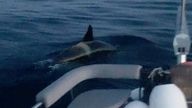
Killer whales ram and sink sailing yacht off Gibraltar coast
Related Topics:
Just two days earlier, six orcas rammed the hull of another yacht in the Strait of Gibraltar.
It followed a similar reported incident in November off the coast of Portugal when another vessel sank after its hull was cracked after being hit.
There have been at least 60 reported incidents between orcas and boats off the Iberian coast already this year, according to data from GT Orca Atlantica working group.
Reports of incidents began in 2020 leading Portugal's National Marine Agency to issue a statement warning sailors of the mammal's "curious behaviour".
It said the whales may be attracted to rudders and propellers and warned sailors to switch-off boat engines if the whales approach.
Read more on Sky News: France bans short-haul flights to tackle climate change Italy pledges £1.8bn aid package for flood-hit areas in northern Italy
A year later Spanish authorities banned small boats from sailing near the coast of Cape Trafalgar following 50 encounters with orcas, including 25 in which boats had to be towed to shore.
Iberian orcas are an isolated subpopulation of killer whales that can grow up to 21ft (6.5m) in length. They are classified as critically endangered by the International Union for Conservation of Nature.
Related Topics
- Skip to main content
- Keyboard shortcuts for audio player
Orcas sank a yacht off Spain — the latest in a slew of such 'attacks' in recent years
Scott Neuman

Killer whales are pictured during a storm in the fjord of Skjervoy in 2021 off the coast of northern Norway. Researchers say orcas are stepping up "attacks" on yachts along Europe's Iberian coast. Olivier Morin/AFP via Getty Images hide caption
Killer whales are pictured during a storm in the fjord of Skjervoy in 2021 off the coast of northern Norway. Researchers say orcas are stepping up "attacks" on yachts along Europe's Iberian coast.
The crew of a sinking yacht was rescued off the coast of Spain this week after a pod of orcas apparently rammed the vessel – the latest "attack" by the marine mammals in the area that has left scientists stumped, several boats at the bottom of the ocean and scores more damaged.

Killer whales are 'attacking' sailboats near Europe's coast. Scientists don't know why
The encounter on Sunday between an unknown number of orcas, also known as "killer whales," and the 49-foot sailing yacht Alboran Cognac occurred on the Moroccan side of the Strait of Gibraltar, the narrow passage linking the Atlantic and Mediterranean where the majority of such incidents have occurred in recent years.
The Alboran Cognac's crew said they felt sudden blows on the hull and that the boat began taking on water. They were rescued by a nearby oil tanker, but the sailboat, left to drift, later went down.
The sinking brings the number of vessels sunk – mostly sailing yachts – to at least five since 2020. Hundreds of less serious encounters resulting in broken rudders and other damage, Alfredo López Fernandez, a coauthor of a 2022 study in the journal Marine Mammal Science, told NPR late last year.
As NPR first reported in 2022, many scientists who study orca behavior believe these incidents — in which often one or more of the marine mammals knock off large chunks of a sailboat's rudder — are not meant as attacks, but merely represent playful behavior.
View this post on Instagram A post shared by Catamaran Guru(@catamaranguru)
Some marine scientists have characterized these encounters over the years as a "fad," implying that the animals will eventually lose interest and return to more typical behavior.
The study co-authored by López Fernandez, for example, indicated two years ago that orcas were stepping up the frequency of their interactions with sailing vessels in and around the Strait of Gibraltar.
Some researchers think it's merely playful behavior
One hypothesis put forward by Renaud de Stephanis, president and coordinator at CIRCE Conservación Information and Research, a research group based in Spain, is that orcas like the feel of the water jet produced by a boat's propeller.
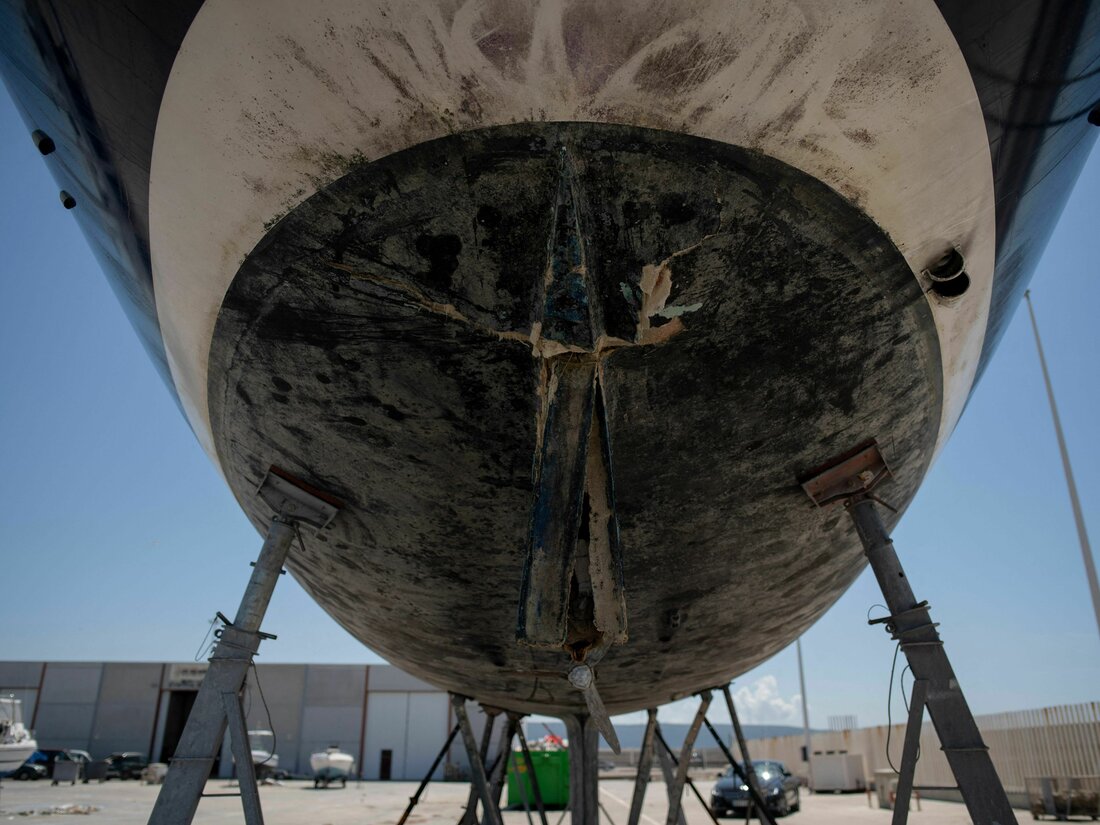
A picture taken on May 31, 2023, shows the rudder of a vessel damaged by killer whales ( Orcinus orca ) while sailing in the Strait of Gibraltar and taken for repairs at the Pecci Shipyards in Barbate, near Cadiz, southern Spain. Jorge Guerrero/AFP via Getty Images hide caption
A picture taken on May 31, 2023, shows the rudder of a vessel damaged by killer whales ( Orcinus orca ) while sailing in the Strait of Gibraltar and taken for repairs at the Pecci Shipyards in Barbate, near Cadiz, southern Spain.
"What we think is that they're asking to have the propeller in the face," de Stephanis told NPR in 2022. "So, when they encounter a sailboat that isn't running its engine, they get kind of frustrated and that's why they break the rudder."
In one encounter last year, Werner Schaufelberger told the German publication Yacht that his vessel, Champagne, was approached by "two smaller and one larger orca" off Gibraltar.
"The little ones shook the rudder at the back while the big one repeatedly backed up and rammed the ship with full force from the side," he said.
The Spanish coast guard rescued Schaufelberger and his crew, towing Champagne to the Spanish port of Barbate, but the vessel sank before reaching safety.

A worker cleans Champagne, a vessel that sank after an attack by orcas in the Strait of Gibraltar and was taken for repairs at the Pecci Shipyards in Barbate, near Cadiz, southern Spain, on May 31, 2023. Jorge Guerrero/AFP via Getty Images hide caption
A worker cleans Champagne, a vessel that sank after an attack by orcas in the Strait of Gibraltar and was taken for repairs at the Pecci Shipyards in Barbate, near Cadiz, southern Spain, on May 31, 2023.
The encounters could be a response to past trauma
López Fernandez believes that a female known as White Gladis, who leads the group of around 40 animals, may have had a traumatizing encounter with a boat or a fishing net. In an act of revenge, she is teaching her pod-mates how to carry out attacks with her encouragement, he believes.
"The orcas are doing this on purpose, of course, we don't know the origin or the motivation, but defensive behavior based on trauma, as the origin of all this, gains more strength for us every day," López Fernandez told Live Science .
It's an intriguing possibility, Monika Wieland Shields, director of the Orca Behavior Institute , told NPR last year.
"I definitely think orcas are capable of complex emotions like revenge," she said. "I don't think we can completely rule it out."
However, Shields said she remained skeptical of the "revenge" hypothesis. She said that despite humans having "given a lot of opportunities for orcas to respond to us in an aggressive manner," there are no other examples of them doing so.
Deborah Giles, the science and research director at Wild Orca, a conservation group based in Washington state, was also cautious about the hypothesis when NPR spoke to her last year. She pointed out that killer whale populations in waters off Washington "were highly targeted" in the past as a source for aquariums. She said seal bombs – small charges that fishers throw into the water in an effort to scare sea lions away from their nets – were dropped in their path while helicopters and boats herded them into coves.
"The pod never attacked boats after that," she said.
May 24, 2023
Why Has a Group of Orcas Suddenly Started Attacking Boats?
Killer whales in a group near Spain and Portugal may be teaching one another to mess with small boats. They sank their third vessel earlier this month
By Stephanie Pappas
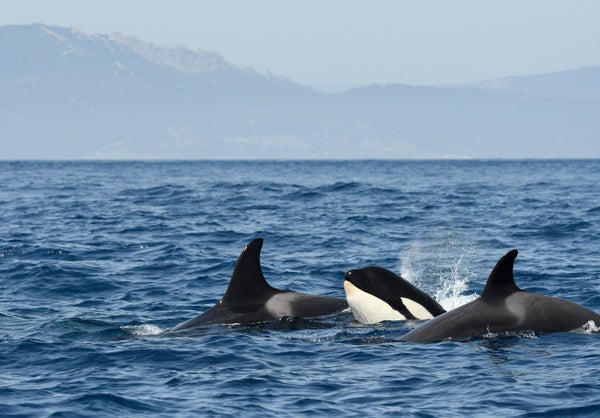
A group of three orcas, also known as killer whales, are seen swimming in the Strait of Gibraltar. Individuals in the critically endangered subpopulation have been attacking boats off the coast of the Iberian Peninsula.
Malcolm Schuyl/Alamy Stock Photo
A trio of orcas attacked a boat in the Strait of Gibraltar earlier this month, damaging it so badly that it sank soon afterward.
The May 4 incident was the third time killer whales ( Orcinus orca ) have sunk a vessel off the coasts of Portugal and Spain in the past three years. The subpopulation of orcas in this region began harassing boats, most often by biting at their rudder, in 2020. Almost 20 percent of these attacks caused enough damage to disable the vessels, says Alfredo López, an orca researcher at the Atlantic Orca Working Group (GTOA), which monitors the Iberian killer whale population. “It is a rare behavior that has only been detected in this part of the world,” he says.
Researchers aren’t sure why the orcas are going after the watercraft. There are two hypotheses, according to López. One is that the killer whales have invented a new fad, something that subpopulations of these members of the dolphin family are known to do. Much as in humans, orca fads are often spearheaded by juveniles, López says. Alternatively, the attacks may be a response to a bad past experience involving a boat.

On supporting science journalism
If you're enjoying this article, consider supporting our award-winning journalism by subscribing . By purchasing a subscription you are helping to ensure the future of impactful stories about the discoveries and ideas shaping our world today.
The first known incident occurred in May 2020 in the Strait of Gibraltar, an area with heavy boat traffic. Since then GTOA has recorded 505 cases of orcas reacting to boats. Sometimes they simply approached the vessels, and only a fraction of cases involved physical contact, López says. In a study published in June 2022 in Marine Mammal Science , he and his colleagues cataloged 49 instances of orca-boat contact in 2020 alone. The vast majority of the attacks were on sailboats or catamarans, with a handful involving fishing boats and motorboats. The average length of the vessels was 12 meters (39 feet). For comparison, a full-grown orca can be 9.2 meters (30 feet) long.
The researchers found that the orcas preferentially attack the boats’ rudder, sometimes scraping the hull with their teeth. Such attacks often snap the rudder, leaving the boat unable to navigate. In three cases, the animals damaged a boat so badly that it sank: In July 2022 they sank a sailboat with five people onboard. In November 2022 they caused a sailboat carrying four to go down. And finally, in this month’s attack, the Swiss sailing yacht Champagne had to be abandoned, and the vessel sank while it was towed to shore. In all cases, the people onboard were rescued safely.
In 2020 researchers observed nine different individual killer whales attacking boats; it’s unclear if others have since joined in. The attacks tended to come from two separate groups: a trio of juveniles occasionally joined by a fourth and a mixed-aged group consisting of an adult female named White Gladis, two of her young offspring and two of her sisters. Because White Gladis was the only adult involved in the initial incidents, the researchers speculate that she may have become entangled in a fishing line at some point, giving her a bad association with boats. Other adult orcas in the region have injuries consistent with boat collisions or entanglement, López says. “All this has to make us reflect on the fact that human activities, even in an indirect way, are at the origin of this behavior,” he says.
The safe rescue of everyone involved, however, suggests to Deborah Giles that these orcas don’t have malevolent motivations against humans. Giles, science and research director of the Washington State–based nonprofit conservation organization Wild Orca, points out that humans relentlessly harassed killer whales off the coasts of Washington and Oregon in the 1960s and 1970s, capturing young orcas and taking them away for display at marine parks. “These are animals that, every single one of them, had been captured at one point or another—most whales multiple times. And these are whales that saw their babies being taken away from them and put on trucks and driven away, never to be seen again,” Giles says. “And yet these whales never attacked boats, never attacked humans.”
Though it’s possible that the orcas around the Iberian Peninsula could be reacting to a bad experience with a boat, Giles says, it’s pure speculation to attribute that motivation to the animals. The behavior does seem to be learned, she says, but could simply be a fad without much rhyme or reason—to the human mind, anyway. Famously, some members of the Southern Resident orcas that cruise Washington’s Puget Sound each summer and fall spent the summer of 1987 wearing dead salmon on their head. There was no apparent reason for salmon hats to come in vogue in orca circles, but the behavior spread and persisted for a few months before disappearing again. “We’re not going to know what’s happening with this population,” Giles says, referring to the Iberian orcas.
The Iberian orca attacks typically last less than 30 minutes, but they can sometimes go on for up to two hours, according to the 2022 study. In the case of the Champagne, two juvenile killer whales went after the rudder while an adult repeatedly rammed the boat, crew members told the German magazine Yacht . The attack lasted 90 minutes.
The Iberian orca subpopulation is considered critically endangered, with only 39 animals the last time a full census was conducted in 2011. A 2014 study found that this subpopulation follows the migration of their key prey , Atlantic bluefin tuna—a route that puts them in close contact with human fishing, military activities and recreational boating. Maritime authorities recommend that boaters in the area slow down and try to stay away from orcas, López says, but there is no guaranteed way to avoid the animals. He and his colleagues fear the boat attacks will come back and bite the orcas, either because boaters will lash out or because the attacks are dangerous to the animals themselves. “They run a great risk of getting hurt,” López says.
Orcas sank a third boat. Scientists think these 'brutal' attacks may be trauma-driven.
- Orcas keep attacking sailboats off the coasts of Spain and Morocco.
- Earlier this month two attacks were reported where one ended up sinking the boat.
- Scientists can't explain the attacks but one leading theory points to a single, traumatized orca.

Orcas are targeting sailboats near the Iberian Peninsula, and nobody knows why.
Most of the attacks involve multiple orcas ramming the boat but it remains afloat. In several cases, however, the animals have managed to sink entire boats.
The third case of orcas sinking a boat happened earlier this month off the Iberian coast, LiveScience reported .
"The attacks were brutal"
Skipper Werner Schaufelberger was sailing at night off the coast of Spain when three orcas started to attack his boat.
"At first I thought we had hit something. But then I quickly realized that it was orcas attacking the ship," Schaufelberger told the German publication Yacht .
"The attacks were brutal. There were two smaller and one larger orca. The two little ones shook the rudder while the big one kept running and then rammed the ship from the side with full force," he added.
The Spanish coast guard rescued Schaufelberger and the rest of the crew and towed the boat to port, where it sank right before reaching port.
It's important to note that the vast majority of interactions with orcas don't end with a sunk boat. These attacks near the Iberian Peninsula may be due to a single, traumatized orca that has taught this behavior to other, fellow orcas, LiveScience reported.
"The orcas are doing this on purpose, of course, we don't know the origin or the motivation, but defensive behavior based on trauma, as the origin of all this, gains more strength for us every day," biologist Alfredo López Fernandez at the University of Aveiro in Portugal and representative of the Atlantic Orca Working Group, told LiveScience.
Other orca attacks
Schaufenlberger wasn't the only victim this month. On May 2, Greg Blackburn thought his boat was hitting rough waves when the thumps began as he sailed through the Strait of Gibraltar near Tangier, Morocco, according to 9News .
Related stories
But as the jolts continued, and the rudder seemed to resist his steering, Blackburn looked down and saw two orcas repeatedly ramming his boat, and soon two more joined in.
"There's not a lot you can do at that point," Blackburn, a sailor from the UK, told 9News. "After reading reports and knowing what has been going on, just thought we were in for a ride now."
Another pair of notable orca attacks occurred last July, when a pod of orcas struck a sailboat off the coast of Portugal and, just hours later, targeted another vessel in the same area, according to reports.
Orca attacks are becoming more common
A collaboration of researchers has recorded more than 200 reports of "interactions," where orcas approach or touch a vessel, along Portugal and Spain's Iberian Peninsula since 2020.
Insider previously reported in 2020 about a series of aggressive actions by orcas along the Spanish and Portuguese coasts. At the time, scientists had different theories: The killer whales could be acting out of curiosity, mischief, territoriality, or trauma.
López Fernandez suspects that one, traumatized female orca may be to blame. Her name is White Gladis and, according to LiveScience, she may have experienced a collision with a boat or entrapment during illegal fishing. The incident changed something in Gladis.
"That traumatized orca is the one that started this behavior of physical contact with the boat," López Fernandez told LiveScience.
Whatever the reason for the growing number of attacks — whether it's Gladis or something else — if you encounter an orca in the wild there are some guidelines for what to do:
- Keep a low profile on deck. Don't excite the orcas.
- Contact authorities on VHF 16, or by phone on 112
If the orcas ram your boat, secure yourself to something because the last thing you should ever do is enter the water when orcas are nearby.
Correction: May 9, 2023 — An earlier version of this story misstated the nature of the 200 orca incidents reported since 2020, as well as the origin of that statistic. Those reports were of interactions between orcas and boats, not necessarily attacks. And that number comes from a collaboration of scientists collecting reports, not from local media outlets.
This post has been updated with new information. It was originally published on August 13, 2022.
Watch: Orcas are under threat from man-made noise pollution. These scientists are fighting to protect them.
- Main content
Orcas have attacked and sunk another boat in Europe — and experts warn there could be more attacks soon
A group of orcas known to attack boats in southwest Europe have sunk a 50-foot sailing yacht in the Strait of Gibraltar after ripping open its hull. It is the fifth time these killer whales have sent a ship to the seafloor in the last three years.
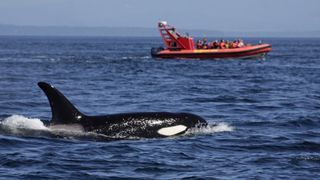
Orcas that have been terrorizing boats in southwest Europe have just sank their fifth yacht in three years. And experts have warned that more attacks are likely in the coming months after the orcas unexpectedly switched up their behavior earlier this year.
On Sunday (May 12), an unknown number of orcas ( Orcinus orca ) attacked the 49-foot-long (15 meters) sailing yacht named the Alboran Cognac in the Strait of Gibraltar — a narrow body of water between southern Spain and North Africa that separates the Atlantic Ocean and Mediterranean Sea. During the attack, which began at around 9 a.m. local time, the killer whales repeatedly rammed the boat's hull and rudder, Reuters reported .
The yacht's two-person crew radioed for help and was rescued by a passing oil tanker. But the vessel's hull sustained serious damage during the attack and the yacht began to take on water, which eventually caused it to sink, Reuters reported.
The attack was likely carried out by a growing number of individuals from the Iberian subpopulation of orcas — a group of around 40 killer whales that live off the coasts of Spain, Portugal, Morocco and Gibraltar — that have been attacking boats across their range since 2020.
Most of the attacks occur between May and August each year in and around the Strait of Gibraltar. However, earlier this year, some of the highly social apex predators were spotted circling a boat in northern Spain , suggesting they have spread out much further and earlier than normal.
As a result, the Spanish authorities have warned recreational boaters to avoid sailing too far from the coast and to not stop their vessels if they are approached by orcas, according to a translated statement from Spain's Maritime Safety and Rescue Society.
Related: Orcas are learning terrifying new behaviors. Are they getting smarter?
Sign up for the Live Science daily newsletter now
Get the world’s most fascinating discoveries delivered straight to your inbox.
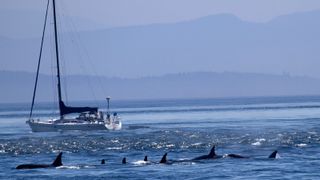
Since the attacks started in 2020, sailors have reported around 700 interactions with orcas in the area, ranging from circling and nudging vessels to ramming, ripping apart and sinking boats, Reuters reported.
The most recent sinking event prior to this one occurred on Halloween last year when a pod of orcas sank a sailing yacht in the Strait of Gibraltar after a near hour-long attack . Before then, at least three other boats were sunk in the region between 2022 and early 2023. However, no humans have been injured or killed.
During attacks, the orcas' most common tactic is to damage or rip off the vessel's rudder , which makes it impossible to steer the vehicles. Researchers believe this is a learned behavior, and eye-witnesses have previously reported seeing individuals seemingly teach other orcas how to do this . As a result, the number of attacks has increased over the last few years.
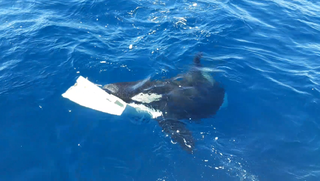
— 11 ways orcas show their terrifying intelligence
— How often do orcas attack humans?
— How orcas gained their 'killer' reputation
So far, at least 15 individuals have been linked to at least one attack in the region. But researchers believe the attacks can be traced back to a single female, named White Gladis, who may have been pregnant when she started harassing the boats. However, it is unclear exactly what sparked the attacks.
There has even been a suggestion that the behavior has spread beyond the Iberian population after an orca similarly attacked a boat in Scotland in 2023. However, this was an isolated incident, which makes it hard to link it to the Iberian attacks.
Harry is a U.K.-based senior staff writer at Live Science. He studied marine biology at the University of Exeter before training to become a journalist. He covers a wide range of topics including space exploration, planetary science, space weather, climate change, animal behavior, evolution and paleontology. His feature on the upcoming solar maximum was shortlisted in the "top scoop" category at the National Council for the Training of Journalists (NCTJ) Awards for Excellence in 2023.
Boat-ramming orcas may be using yachts as target practice toys, scientists suggest
2 young orcas ram sailboat off northern France — 800 miles from 'attack' hotspot
Watch extremely rare footage of a bigfin squid 'walking' on long, spindly arms deep in the South Pacific
Most Popular
- 2 'The secret to living to 110 was, don't register your death': Ig Nobel winner Saul Justin Newman on the flawed data on extreme aging
- 3 New self-swab HPV test is an alternative to Pap smears. Here's how it works.
- 4 Nuking an asteroid could save Earth from destruction, researchers show in 1st-of-its-kind X-ray experiment
- 5 Experts predicted way more hurricanes this year — here's the weird reason we're 'missing' storms

IMAGES
COMMENTS
The most recent encounter occurred on May 4 off the coast of Spain. Three orcas struck the rudder and side of a sailing yacht, causing it to eventually sink, as was reported earlier this month in ...
Scientists don't know why. An orca pod seen in the Strait of Gibraltar in 2021. Ester Kristine Storkson was asleep on her father's small yacht earlier this month, sailing off the coast of France ...
Nature Reporter. An orca rammed and lifted up a yacht with its mouth in the latest attack to occur off the coast of Portugal. Experienced sailors Paul and Norma Russell had been sailing from ...
FOLLOW. Orcas have attacked and sunk a sailboat with five people on board, miles from the Portugal coast. The sailboat was about six miles off the coast of Sines when the mammals attacked, a ...
A yacht was attacked by a group of orcas off the coast of Portugal on Monday, causing a panicked sailor to light up his emergency beacon. Phep Philouceros, a 70-year-old retired sailor, was ...
An orca interaction with a French Beneteau Oceanis 393 results in the keel being pulled away and the yacht Smousse taking on water. To read the full story - ...
Nature Reporter. Orcas that sunk a boat in Portugal ripped a huge hole in the back before tearing off the rudder and swimming away with it. The French sailboat became the latest to sink on ...
James Crisp. 09 August 2023 11:17am. A French sailor was forced to broadcast a mayday call after his yacht was attacked by killer whales off the coast of Portugal. Phep Philouceros, 70, who is ...
Three orcas reportedly attacked the rudder and side of a sailing yacht off the coast of Spain on 4 May. The coastguard rescued all of the people aboard but the boat eventually sank.
Three orcas (Orcinus orca), also known as killer whales, struck the yacht on the night of May 4 in the Strait of Gibraltar, off the coast of Spain, and pierced the rudder."There were two smaller ...
Olivier Morin/AFP via Getty Images. The crew of a sinking yacht was rescued off the coast of Spain this week after a pod of orcas apparently rammed the vessel - the latest "attack" by the marine ...
In the case of the Champagne, two juvenile killer whales went after the rudder while an adult repeatedly rammed the boat, crew members told the German magazine Yacht. The attack lasted 90 minutes ...
A small group of orcas is causing a lot of damage to boats off the Iberian Peninsula. Last month, killer whales rammed a boat continuously for over an hour, ...
Research group Grupo Trabajo Orca Atlántica (GTOA), which tracks populations of the Iberian orca sub-species, says there have been almost 700 interactions since orca rammings were first reported ...
On June 19 an orca rammed a 7-ton yacht multiple times off the Shetland Islands in Scotland, according to an account from retired Dutch physicist Dr. Wim Rutten in the Guardian. "Killer whales are ...
May 19, 2023, 12:15 PM PDT. A pod of orcas swim near a boat. Getty Images. Orcas keep attacking sailboats off the coasts of Spain and Morocco. Earlier this month two attacks were reported where ...
A group of orcas known to attack boats in southwest Europe have sunk a 50-foot sailing yacht in the Strait of Gibraltar after ripping open its hull. It is the fifth time these killer whales have ...
Iberian orca attacks. Beginning in 2020, a subpopulation of orcas (Orcinus orca) began ramming boats and attacking their rudders in waters off the Iberian Peninsula. The behaviour has generally been directed towards slow-moving, medium-sized sailboats in the Strait of Gibraltar and off the Portuguese, Moroccan and Galician coasts.
An orca hit a seven-ton yacht carrying a 72-year-old multiple times on Monday off the Shetland Islands in Scotland, the sailor told The Guardian. Retired Dutch physicist Dr Wim Rutten said he was ...
In the Strait of Gibraltar, one individual orca has been named by scientists as the main culprit for the attacks. White Gladis and her pod have been ramming boats in the area for the past few ...
A terrifying orca attack struck the crew of the sailing yacht Bonhomme William last night, just 2 miles off Punta Camarinal in the Strait of Gibraltar. What ...